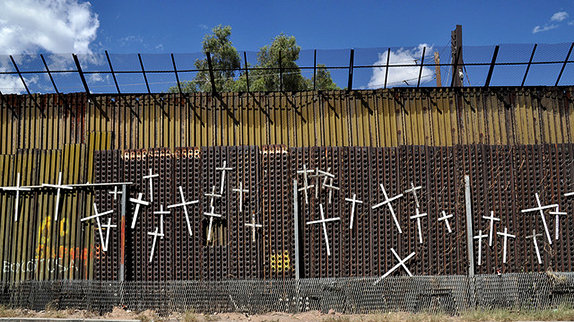
Families and young people decide to flee the horrendous violence in their Central American countries of El Salvador, Guatemala and Honduras, arrive on our border after a terrifying journey through Mexico and surrender themselves to our immigration authorities. Suddenly we have another immigration crisis.
What happens?
 Congress argues but does nothing. President Obama ponders and then defers until after the elections. Is anyone going to do anything this humanitarian crisis? Allegra Love from Santa Fe is one of the very few. She’s a recent graduate of the University of New Mexico Law School and was formerly a 3rd and 4th grade teacher in bi-lingual education at Agua Fria Elementary School. Allegra became concerned about the plight of immigrant families and, in an effort to learn more, went to volunteer at Byrd Camp--the camp in the desert south of Tucson managed by the Tucson-based organization, No More Deaths.
Congress argues but does nothing. President Obama ponders and then defers until after the elections. Is anyone going to do anything this humanitarian crisis? Allegra Love from Santa Fe is one of the very few. She’s a recent graduate of the University of New Mexico Law School and was formerly a 3rd and 4th grade teacher in bi-lingual education at Agua Fria Elementary School. Allegra became concerned about the plight of immigrant families and, in an effort to learn more, went to volunteer at Byrd Camp--the camp in the desert south of Tucson managed by the Tucson-based organization, No More Deaths.
The camp is only ten miles from the Mexican border, the terrain is steep and rocky and in summer the heat is staggering. Therefore, the water that volunteers like Allegra leave in the desert saves many lives. She then decided to go to UNM Law School to become an immigration lawyer, graduated in 2011 and now works in the Adelante program in the Santa Fe Public Schools. The goal of the program is to provide advocacy, tutoring, evening programs and material aid to children, teens and families that are experiencing homelessness in Santa Fe. One of her projects is conducting counseling sessions for immigrant families at St. Bede’s Episcopal Church on Fridays.
In June and July, when the border was flooded with migrants from Central America, she flew to Villahermosa, Mexico, took a bus to a town thirty miles from the border and hitch hiked the rest of the way to the Mexico-Guatemala border where she spent several weeks as a volunteer in a migrant relief center.
Despite all the attention focused on children, she has made it clear that “It is not only children who are pouring out of Central America fearfully and desperately. There are fathers, mothers, young adults, grandparents and adult sons and daughters fleeing and arriving at greater rates than the children on whom we are focused so intently. The violence and terror that has besieged the region does not discriminate by age.”
Most of her work was with Hondurans fleeing what is the most dangerous country in the world with a murder rate that is eighteen times higher than the US and four times higher than Mexico. The murder rate in El Salvador is fourteen times higher than ours and Guatemala is eight times higher, the two other key countries. Many Americas would like to say that this is their problem. I disagree and share the view of columnist Mary Anastasia O’Grady who wrote recently that, “this crisis was born of American self-indulgence. Solving it starts with taking responsibility for the demand for drugs that fuels criminality.” It’s our demand for drugs that is destabilizing these countries and we, therefore, have a responsibility to those who are being harmed.
In late August, Allegra went to Artesia to volunteer her time as an attorney in the center where some 500 migrants are being detained. One of the major issues is whether or not they can prepare what is called an asylum case in an effort to remain in the US, showing that they have a credible fear of harm should they be returned to their country of origin. Although this is the fate facing many of them, it’s extremely hard to prove when you are detained and have no way to gather the evidence you need. Accordingly, one of the major goals of the volunteer attorneys like Allegra is to have these detainees released on bond. The problem is that many of the bonds are way too high.
Allegra made a second trip to Artesia again last Friday. This time she writes that, “There are little bits of hope, the team here has already won two asylum hearings and we’re working today for another win tomorrow; families are starting to bond out …. Yesterday, two happy and friendly guards were giving the little kids haircuts with a real barber chair set up. They had the radio on and even had chairs for the moms to wait in with People magazines in Spanish to read…. However silly and mundane, it was the first genuine moment of joy that I have seen here.”
She also talks of the volunteer attorneys who are putting in eighteen hour days many miles from their homes. “They are really smart and competent and creative and committed and full of good spirits … but also far from home and overwhelmed and sad and scared, having to witness children suffering. Our belief is that what they are doing shines a light on them this stormy weekend in the desert.”
Lawyers like her are making a difference. As she says, “At times it feels overwhelming, but that’s not a reason not to try.”
(Photo of border fence crosses by Jonathan McIntosh)



Responses to “Love shines light on immigration crisis”